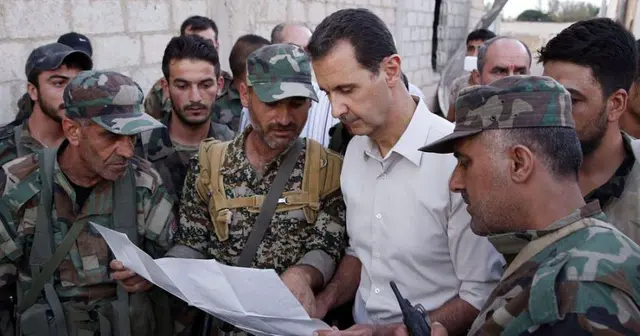The U.S.-led airstrike on Syrian military positions in the eastern province of Deir al-Zour was one of the main reasons behind the faltering efforts to resume a recently-established ceasefire, political analysts said.
Just days after a U.S.-Russian brokered ceasefire went into effect, warplanes with the U.S.-led anti-terror coalition attacked Syrian military positions in Deir al-Zour, killing 90 Syrian soldiers and wounding over 100 others.
The U.S. said the strikes were "unintentional," but government officials in Syria as well as political analysts said the strikes aimed to weaken the Syrian military presence in Deir al-Zour in favor of the Islamic State (IS) group and also to bring back the recently reached deal with Russia to ground zero.
Syrian President Bashar al-Assad said the attack was a flagrant aggression on Syrian military forces in favor of the IS.
The general-command of the Syrian army, meanwhile, said the ceasefire was a good opportunity but the foreign-backed rebels violated it over 300 times.
"The U.S. airstrikes on Syrian military positions were the main reason behind undermining the ceasefire," Hmaidi Abdullah, a political analyst, told Xinhua.
He believes that the United States wasn't fully satisfied with the deal it struck with Russia, whose content wasn't made public.
"The United States was lurking for an opportunity to render the deal flat," he said, adding that the rebel violations were enough to bring the ceasefire to a halt, but the strikes had hastened the collapse of the truce.
A day earlier, the Syrian army announced that the ceasefire was ended, speaking nothing on possible extension.
The army blamed the rebels and their backers on the violations that were made during the week-long truce.
Meanwhile, Abdullah shunned aside the U.S. claims that the strikes were carried out on mistake, saying the strikes rendered a great help to IS, which attacked Syrian military positions after the strikes and succeeded to take over several positions.
For his part, Muin Ibrahim, another political analyst, said the Syrian army was the sole victim in the ceasefire, and the strike was the straw that broke the camel's back.
He said the strikes were a clear message that the United States wants to impose its vision of a settlement, and to tell the Russians that it could turn the table at anytime.
Bashar al-Jafaari, the Syrian representative at the United Nations, said the strikes not only undermined the truce, but also exposed the U.S. backing of the IS group.
Rami Abdul-Rahman, head of the oppositional Syrian Observatory for Human Rights, also said the truce has become a past following the collapses it had witnessed on its forth day, and the coalition strikes on the Syrian military positions in Deir al-Zour.
"The Russian-American deal must come out to light, as one of its stages was the formation of a joint operation room, but apparently the deal didn't satisfy the U.S. Department of Defense, " he said.
Just hours after the truce expired on Monday evening, the rebels attacked several military positions in the northern province of Aleppo and the central province of Hama.
Opposition activists also spoke of tens of airstrikes on rebel- held areas, one of which targeted the aid convoys in Aleppo, killing 20 civilians, including one official with the Syrian Arab Red Crescent.
The UN announced Tuesday that it had suspended all aid convoys in Syria after its lorries were attacked by warplanes near Aleppo on Monday.
(APD)
 简体中文
简体中文

